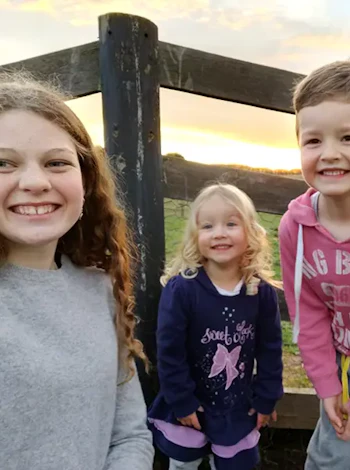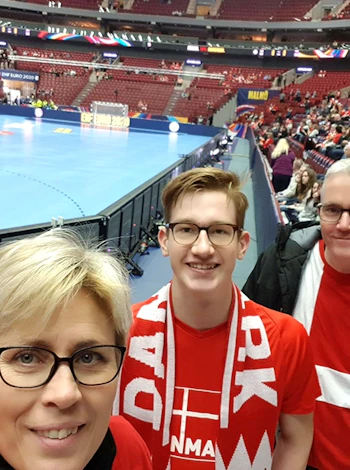High school exchange program
in Denmark
Live the life of a Danish student, living with a host family and studying at a local high school for a short-term, semester or year exchange program.








Experience the hygge lifestyle
on your skin
Student exchange program in Denmark
In Denmark, personal wellbeing is a fundamental aspect of life and this might explain why the Danish people are amongst the happiest in the world. They rejoice in simple pleasures, stay in the present moment, carve out time for friends and family.
Known for its excellent work-life balance, open and innovative society and commitment to environmental responsibility, Denmark offers a rich cultural immersion experience and is sure to teach you invaluable life lessons.
Discover this unusual destination during your exchange program: beautiful landscapes, a rich culture and welcoming, happy people. Try on a new way of life!

Discover the joy of being 'in the moment'
Hygge
Whether it's a steaming mug of hot chocolate, a soft blanket, candle lights or a feel-good book, rejoice in the small pleasures of life. Take a moment to relax in a pleasant environment you have created for yourself.
What's high school like in Denmark?
Self-fulfilment
Danish schooling spurs students to become independent and self-accountable through group work and hands-on projects. Students are also encouraged to express their creativity and opinions. You will gain autonomy and confidence in yourself!
A personalised program
You will have a few compulsory subjects, such as Danish, maths or English, just like local students. However, you will also be able to personalise your school experience by choosing subjects that appeal to you and exploring new interests that will help you find your way.
Two languages, two ways of seeing the world
While Danish is the official language, most of the population is also fluent in English and this is one of the core subjects at school. Ready to teach your teachers and classmates some typical Australian English expressions?
A burst of endorphins
Like the rest of Scandinavians, the Danes are a sporty bunch. Both inside and outside of school, you will be able to participate in sports – think skiing, hockey, skating, but also soccer and European handball. Find your favourite activity and boost your well-being!
A small country of great beauty. Let it surprise you with an exchange experience!
Choose authenticity – trust WEP and prepare to be amazed.
On a WEP Classic program, you will experience the most authentic side of Denmark. You may be placed anywhere in the country, depending on the location of the host family who has chosen you to share this incredible adventure with.
Volunteer host family
Public school
Placement anywhere in Denmark
Short-term, semester or year programs available
Your host family during your year abroad
Gain a second family – they can’t wait to welcome you into their lives!
Here is why:
Danish people are relaxed and friendly, and they highly value family ties. They will help you feel comfortable, and you will become a true member of the family.
By sharing your host family’s daily life, you will discover the authentic Danish lifestyle from the inside. Evening meals eaten together, weekend outings, traditional holidays and celebrations... there is no better way to get close to another culture!
Your Danish family will give you lots of independence; it will be a fantastic opportunity to improve your maturity and become more accountable. Of course, your host family will always be available to help and provide guidance should you need it.



Your school in Denmark
Find out more about your school experience in Denmark
In Denmark, each child's education journey usually commences at kindergarten (98% of Danish children attend a public kindergarten by the age of 3). Compulsory education begins at 6 years old and lasts for 10 years, starting with Folkeskole. The equivalent of our primary and middle school, Folkeskole consists of a ‘0 grade’ class, nine grades, and an optional 10th grade.
Secondary schooling starts at 16 years of age, when students choose which type of high school they will attend depending on their vocation and interests (a choice that, the Danes think, is too important to make any earlier). Different types of high schools include Gymnasium (academically focused, preparing students for higher education), Højere handelseksamen and Højere tekniskeksame (focusing respectively on business/marketing/economics and technical sciences/natural sciences/informatics). Efterskole is another possibility, consisting of a residential college where students focus on specific topics of interest for one, two or three years.
The educational approach in Denmark avoids class rankings, marks and formal tests; the emphasis is on social problem-solving, not memorisation. Wearing a uniform is not required and some students call their teachers by their first names. Nevertheless, respect and discipline are obligatory. Active participation in class and group work are two signature aspects of the Danish education system.
The Danish education system
During the 10 years of compulsory education, subjects are grouped into three areas: humanities, sciences, and practical/creative subjects.
In secondary schools, subject offerings depend on the type of school. Many subjects are elective; compulsory subjects in gymnasiums usually include Danish, English, a second foreign language, mathematics, history, classical studies, physics, PE, religious studies, social sciences and an artistic subject. Bilingual classes, where English is spoken in addition to Danish, are also common.
Subjects in Denmark
Except for Efterskole, all the different types of Danish secondary schools (16+) begin with a 3-month foundation course and continue with a specialised study program, personalised according to each student’s interests. The three years of secondary schooling are usually structured as follows:
* Level 10 (16-17 years old)
* Level 11 (17-18 years old)
* Level 12 (18-19 years old)
Danish secondary schools
Participation in extra-curricular activities after school is very common in Denmark. Many local students play a sport, take part in artistic pursuits such as drama or singing, and get involved in community projects or volunteering. This is usually achieved through clubs and associations outside of school. In addition, it is often possible for students to get additional tutoring with their teachers, who are happy to make themselves available after classes.
Extracurricular activities
The school year in Denmark usually starts in early to mid-August and ends in late June. Each school stipulates its own holiday dates, but usually there is an autumn break (a week off between September and November), a 10-day break over Christmas, a one-week winter break in February and another 10-day break at Easter time (March/April). After this, school goes on until the summer holidays start in late June.
School days and hours also vary from school to school, but students typically attend Monday to Friday, from 8:00 am to 3:00 pm. Classes are usually 45 minutes long, with short breaks (10-15 minutes) between one class and the next, and a half-hour lunch break. School often wraps up early on Fridays, allowing students to spend some time with their classmates.
The school calendar
Danish schools usually have no tests. At the end of each academic year, students sit an exam for specific subjects.
A 7-step grading scale (syv-trins-skalaen) is commonly used for exams and includes grades ranging from –3 to 12. The passing mark is 2.
Grading system in Denmark
Stories from students and parents who have been there
Here are the testimonials of families who have chosen WEP for their exchange experience.
Going with WEP is best
Since 1988, a wide choice of destinations and comprehensive assistance before, during and after your overseas program. WEP is the ideal partner for your big overseas adventure.
Like you, we also get to choose who we travel with: our schools, host families and overseas partner organisations are carefully selected.
We offer a custom-made insurance policy, specifically designed for our participants, and we have a solid network behind us.
Emergency assistance, overseas and from Australia, is available 7 days out of 7, 24 hours a day, 365 days a year.
Allowing all our participants to live their desired overseas experience is a mission, a challenge we're thrilled to accept.
FAQ
Your host family, local coordinator and your host organisation will provide you with support while you are overseas. WEP Australia will remain in contact with the host organisation and your parents to coordinate and support your experience. In case of an emergency, both you and your family will be able to call an emergency phone number that is answered 24/7.
You will be advised of your placement location, host family and host school as soon as feasible. This can range from a few months prior to departure, right up until departure, as a lot needs to happen behind the scenes before each student's placement process is complete and can be communicated to you with certainty. The placement process doesn't only include sourcing a suitable host family, but also finding availability at a local school, and completing all red tape (including, for example, lenghty criminal history checks in some countries). Prior to departure from Australia, all students will receive host family, host school and local coordinator details.
Independent travel is not permissible while on exchange. However, you will be able to travel with your host family, school, host organisation and other community groups such as sporting teams or scouts. Again, the foremost aim of the program is educational, and your priority for any holiday periods must be your host family, who will be investing a lot of time, energy and money into this experience - simply in return for your frienship and positive contribution to their household.
Generally speaking, overseas schools won't issue a diploma to exchange students who are only there for a short time and don't graduate at that school. You may however be provided with a honorary certificate, as well as a WEP certificate of completion, which however don't count towards credit or graduation in Australia.
Language experience is desirable, but not necessary, for most countries. However, some countries have mandatory language requirements. You'll find the specific requirements for each country listed on its page. Intensive language courses may, in some circumstances, meet language pre-requisites. WEP strongly recommends language preparation prior to departure as language knowledge is of enormous benefit in assisting you to quickly adapt to your new family, school and life.
Of course, there are English-speaking destinations available if you are not interested in learning another language.
No, it's the host families who choose the student they wish to invite into their home. Based on the documents you will submit as part of your WEP application, one lucky family will choose to open their home and hearts to you, which is why for all Exchange Classic programs, and many Flex programs as well, there is no avenue for students to choose a specific location.
It may be possible to live with an overseas family that you already know (excluding relatives of the student). However, the family will have to be screened and approved, prepared and supported by our partner organisation in the same manner as any other host family. School enrolment must also be available.
More questions?

